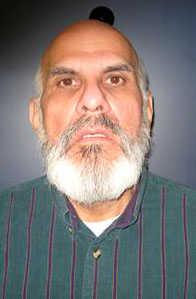Ex-tulia Priest Seeks Venue Change
By Jim McBride
An attorney representing a former Tulia priest facing child indecency charges has asked a judge to change the location of the trial, citing extensive local and national publicity. Lubbock Attorney Rod Hobson said in court documents that John Anthony Salazar, 57, charged with indecency with a child for allegedly touching a 12-year-old boy’s genitals, cannot obtain a fair trial in Tulia. The alleged abuse began in 1997. “It is feared that many, many people that would be potential jurors in this case have already made up their mind on Salazar’s guilt. There exists in the community such a great prejudice that the defendant cannot receive a fair and impartial trial in this county,” according to a motion for a change of venue. The motion also includes statements from three Swisher County residents who agree that Salazar can’t receive a fair trial in Tulia. Dianna Vuittonet, a member of St. Paul’s Catholic Church and the business manager for the Kress Independent School District, said in an affidavit Salazar can’t receive a fair trial because “there exists a great prejudice” against the priest. Salazar, too, questioned whether he can receive a fair trial. “I have spoken to some citizens in Swisher County and they have told me the think the unfair prejudice in that county would prevent me from receiving a fair trial,” he said in court documents. The prosecution, however, disputed the defense’s notion pretrial publicity would preclude the former priest from obtaining impartial jurors to hear the case. Swisher County Attorney Mike Criswell said in a court motion that media coverage of the case has primarily been in Amarillo and Plainview, and has not been extensive. The motion to change the location of the trial should be denied, Criswell said in the motion. Criswell has said he does not wish to discuss the case. Arnold Ehly, a member of Holy Spirit Catholic Church in Tulia, said in an affidavit the county has seen a great deal of population changes in recent years and that he has heard little about the case. “I would be inclined to believe that a substantial part of the population would not have formed an opinion regarding any case that was recently filed concerning John Salazar,” Ehly said. Two other residents, Sam Sadler, a local insurance agent, and Cindy Hurt, senior vice president of Centennial Bank in Tulia, said they don’t believe a substantial part of the county population has formed an opinion about the case. Hobson has said the case against Salazar is weak because there are no witnesses and no medical evidence. Salazar maintains his innocence, Hobson said. Four parishioners have accused Salazar of molesting them. A civil lawsuit filed by three victims dates the earliest abuse to 1991, not long after Salazar arrived in Tulia. The claims, which were settled confidentially in 2006 and 2007, allege Salazar molested two boys in the Tulia church rectory. The third plaintiff’s allegations, made after Salazar had been removed from active ministry in 2002, were tried criminally. In 2005, Salazar was convicted of sexually assaulting the 18-year-old man at a wedding in Dallas County. Salazar denied the claim, but the man was examined at a hospital and had bite marks and bruises on his genitals. Salazar was sentenced to life in prison, but the conviction was overturned on appeal. Salazar accepted a plea deal and was sentenced to eight years in prison. He was freed last October. Salazar now is charged with the sexual abuse of a fourth boy, who claims Salazar molested him multiple times in Tulia and on trips to nearby missions. Salazar remains free on $20,000 bail. The Amarillo Diocese hired Salazar in 1991 directly from a New Mexico treatment program that treated pedophile priests and assigned him to the Church of the Holy Spirit in Tulia, but diocesan officials said earlier they had received no complaints during his service with the tiny parish. In Los Angeles, Salazar pleaded guilty in 1987 to one count of oral copulation and one count of lewd or lascivious acts with a child for molesting two altar boys, ages 13 and 14. He served three years of a six-year prison term before being sent in 1990 to the New Mexico treatment program. He was also required to register as a sex offender and was banned from serving as a priest in the Diocese of Los Angeles. The Diocese of Amarillo hired Salazar and assigned him to the Tulia parish when he was still on parole. In a letter to a Los Angeles cardinal in 1992, former Amarillo Bishop Leroy Matthiesen defended his decision to hire priests with backgrounds of sexual abuse. Matthiesen died in 2010, but in an autobiography he defended his decision to hire molesting priests from the New Mexico program, saying they had “repented, paid the price, were rehabilitated, stayed within the boundaries laid out for them.” The Diocese of Amarillo has since issued a statement by Bishop Patrick Zurek that said “a serious mistake” was made when diocesan officials brought Salazar to Tulia. The Diocese of Amarillo has so far paid $1.2 million from insurance funds to settle allegations involving sexual abuse of minors and another $47,500 in diocesan funds. Zurek said the diocese has since taken steps to ensure the safety of all children within its parishes. The Associated Press contributed to this report. Contact: jim.mcbride@amarillo.com
|
.
Any original material on these pages is copyright © BishopAccountability.org 2004. Reproduce freely with attribution.
